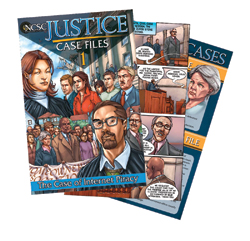"Holy Cross-Claim, Batman!"

Images courtesy of Layne Morgan Media, Inc.
With the convergence of law, media and popular culture, it’s no wonder many young Americans have a skewed view of the U.S. legal system.
And that’s worrying judges, court administrators and others in the system. They’re concerned that an entire generation may grow up without understanding why fair and impartial courts are crucial to democracy. Even worse, they might think courts are set up solely for big corporations, criminals or both.
To illuminate the legal system for this new generation, the National Center for State Courts has decided to deliver the 411 in a way that resonates with the school-aged set: comic books.
Called the Justice Case Files, the comics—that would be “graphic novel” to mom and dad—are designed to present bedrock legal concepts in a way that’s both easy to understand and engaging to read, explains Mary McQueen, president of the Williamsburg, Va.-based center.
First in the series is The Case of Internet Piracy. The colorful 24-page booklet follows the journey of Megan, a college freshman who’s busted for theft because she downloaded music. It also tells the story of her grandmother, who fears losing her home through eminent domain. A second in the series is under development and will tackle identity theft, says McQueen.
The hope is that teens—and adults too—will be intrigued enough to read the books, whether they find copies in a jury room, receive them at a community group meeting or get one through a class at school. (Indeed, the 1,000-copy minimum order means that most of the NCSC’s marketing is targeted toward larger groups, court systems and schools.)
The hope, too, is that readers will learn from them, gaining a better understanding of not only the justice system, but of specific legal issues and how these issues play out in court.
McQueen says the Internet piracy book took more than a year to complete. The center worked with a group of judges, legal professionals and advocacy groups to develop the story. A Missouri company specializing in educational graphic novels handled the artwork and publishing aspects.
From the very beginning, says McQueen, the entire team worked hard to ensure that the stories struck the right balance and got concepts across “in a succinct but accurate way.” That way, justice could be done across each and every page.
For more information on the series, including how to order copies, log on to ncsconline.org.
Correction
An article on legal-themed graphic novels, "Holy Cross-Claim, Batman!" April, incorrectly stated that the National Center for State Courts requires a 1,000-copy order. There is no minimum order.The Journal regrets the error. Write a letter to the editor, share a story tip or update, or report an error.



